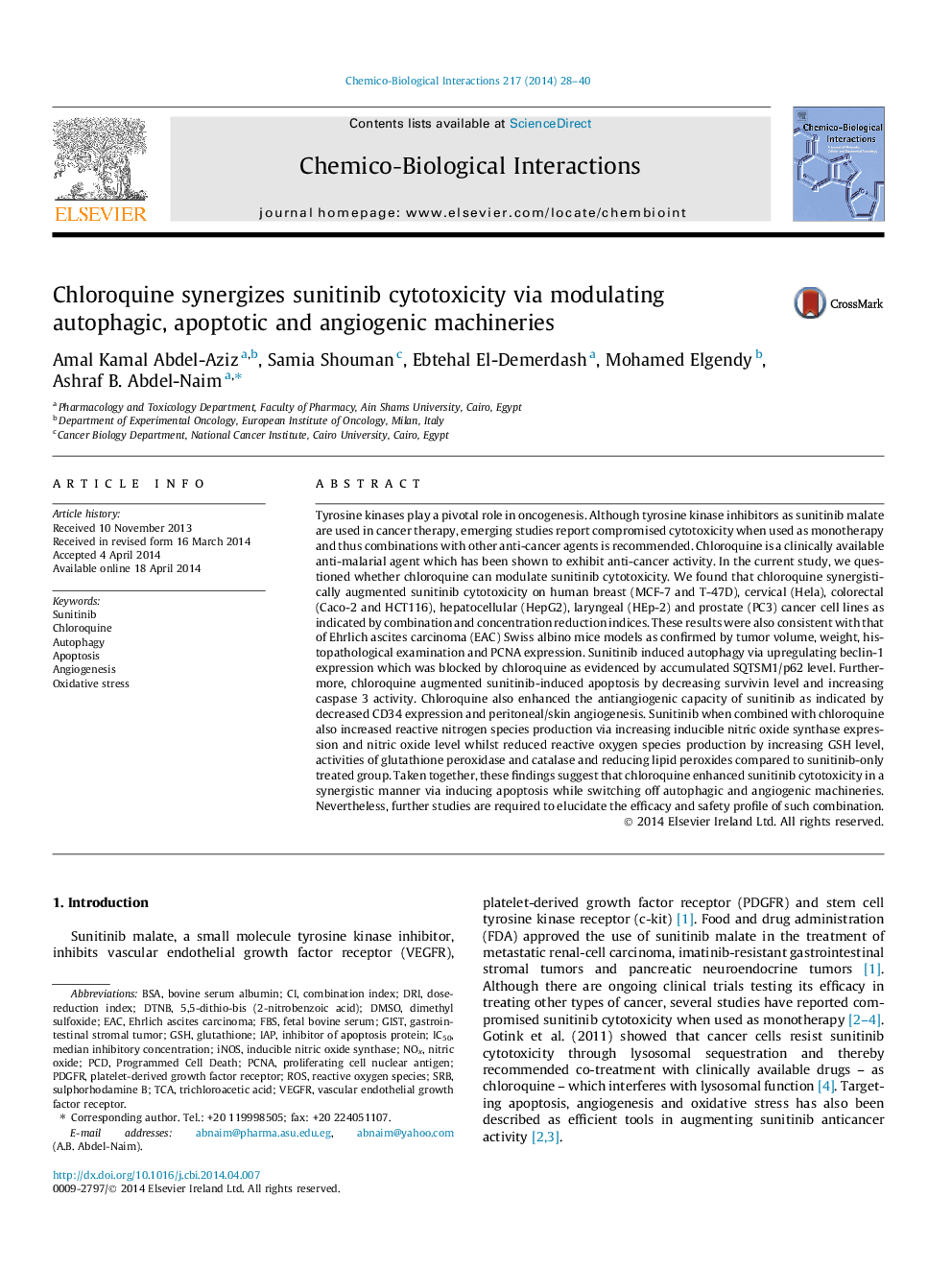| کد مقاله | کد نشریه | سال انتشار | مقاله انگلیسی | نسخه تمام متن |
|---|---|---|---|---|
| 5848056 | 1561624 | 2014 | 13 صفحه PDF | دانلود رایگان |
عنوان انگلیسی مقاله ISI
Chloroquine synergizes sunitinib cytotoxicity via modulating autophagic, apoptotic and angiogenic machineries
ترجمه فارسی عنوان
کلروکین سمیت سلولیت سولیتینیب را از طریق تغییر دادن دستگاه های اتوفاتیک، آپوپتوتیک و آنژیوژنیک
دانلود مقاله + سفارش ترجمه
دانلود مقاله ISI انگلیسی
رایگان برای ایرانیان
کلمات کلیدی
SRBPDGFRVEGFRPCDIAPiNOSDTNBDose-reduction indexGSHTCASulphorhodamine BIC50DRIPCNAEACFBSBSA - BSADMSO - DMSOEhrlich ascites carcinoma - Ehrlich ascites سرطانNOx - NOXROS - ROSbovine serum albumin - آلبومین سرم گاوProliferating Cell Nuclear Antigen - آنتیژن هسته ای تکثیر سلولیAngiogenesis - آنژیوژنزAutophagy - اتوفاژیtrichloroacetic acid - اسید ترشکلراکتیکOxidative stress - تنش اکسیداتیوGastrointestinal stromal tumor - تومور استرومائی گوارشیApoptosis - خزان یاختهایDimethyl sulfoxide - دیمتیل سولفواکسیدSunitinib - سانیتینیبfetal bovine serum - سرم جنین گاوinducible nitric oxide synthase - سنتاز اکسید نیتریک القاییcombination index - شاخص ترکیبیmedian inhibitory concentration - غلظت بازدارنده متوسطProgrammed cell death - مرگ برنامهریزی شده یاختهGist - مشتاقinhibitor of apoptosis protein - مهار کننده پروتئین آپوپتوزیسNitric oxide - نیتریک اکسیدChloroquine - کلروکین Glutathione - گلوتاتیونReactive oxygen species - گونههای فعال اکسیژنplatelet-derived growth factor receptor - گیرنده عامل فاکتور رشد یافته پلاکتvascular endothelial growth factor receptor - گیرنده فاکتور رشد اندوتلیال عروقی
موضوعات مرتبط
علوم زیستی و بیوفناوری
علوم محیط زیست
بهداشت، سم شناسی و جهش زایی
چکیده انگلیسی
Tyrosine kinases play a pivotal role in oncogenesis. Although tyrosine kinase inhibitors as sunitinib malate are used in cancer therapy, emerging studies report compromised cytotoxicity when used as monotherapy and thus combinations with other anti-cancer agents is recommended. Chloroquine is a clinically available anti-malarial agent which has been shown to exhibit anti-cancer activity. In the current study, we questioned whether chloroquine can modulate sunitinib cytotoxicity. We found that chloroquine synergistically augmented sunitinib cytotoxicity on human breast (MCF-7 and T-47D), cervical (Hela), colorectal (Caco-2 and HCT116), hepatocellular (HepG2), laryngeal (HEp-2) and prostate (PC3) cancer cell lines as indicated by combination and concentration reduction indices. These results were also consistent with that of Ehrlich ascites carcinoma (EAC) Swiss albino mice models as confirmed by tumor volume, weight, histopathological examination and PCNA expression. Sunitinib induced autophagy via upregulating beclin-1 expression which was blocked by chloroquine as evidenced by accumulated SQTSM1/p62 level. Furthermore, chloroquine augmented sunitinib-induced apoptosis by decreasing survivin level and increasing caspase 3 activity. Chloroquine also enhanced the antiangiogenic capacity of sunitinib as indicated by decreased CD34 expression and peritoneal/skin angiogenesis. Sunitinib when combined with chloroquine also increased reactive nitrogen species production via increasing inducible nitric oxide synthase expression and nitric oxide level whilst reduced reactive oxygen species production by increasing GSH level, activities of glutathione peroxidase and catalase and reducing lipid peroxides compared to sunitinib-only treated group. Taken together, these findings suggest that chloroquine enhanced sunitinib cytotoxicity in a synergistic manner via inducing apoptosis while switching off autophagic and angiogenic machineries. Nevertheless, further studies are required to elucidate the efficacy and safety profile of such combination.
ناشر
Database: Elsevier - ScienceDirect (ساینس دایرکت)
Journal: Chemico-Biological Interactions - Volume 217, 25 June 2014, Pages 28-40
Journal: Chemico-Biological Interactions - Volume 217, 25 June 2014, Pages 28-40
نویسندگان
Amal Kamal Abdel-Aziz, Samia Shouman, Ebtehal El-Demerdash, Mohamed Elgendy, Ashraf B. Abdel-Naim,
